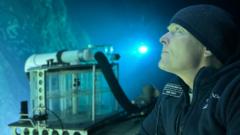In a heartbreaking revelation following the tragic implosion of the Titan submersible, which claimed the lives of five individuals during a deep-sea dive to the Titanic wreck in June 2023, former Oceangate employee David Lochridge has come forward as a whistleblower. With over 25 years of maritime experience, Lochridge claims that significant safety issues he raised during his tenure went ignored, ultimately leading to the catastrophic event.
Lochridge was dismissed from Oceangate in 2018 after voicing concerns regarding safety protocols and the experimental materials being used in the construction of the Titan. His foreboding predictions became a grim reality when the submersible failed during its descent. "People were sold a lie," he stated, underscoring the lack of transparency from Oceangate's management about the risks involved with the submersible’s design.
In an investigative report from the U.S. Coast Guard (USCG) released recently, shortcomings in safety assessments and operational practices were highlighted as key factors that contributed to the disaster. Lochridge, who had been excited about the project when he initially joined in 2011, soon found himself questioning the directives that came from Oceangate's leadership, particularly CEO Stockton Rush.
The situation escalated when Oceangate ceased collaboration with the University of Washington's Applied Physics Laboratory and transitioned the sub's design and construction in-house. Concerned about the inexperienced engineers overseeing such a high-risk project, Lochridge consistently raised alarms, detailing visible defects in the carbon fiber hull—including critical structural issues that were later found to be fatal.
Despite feeling a duty of care to ensure the safety of all passengers and crew members designated to board the Titan, Lochridge's concerns were met with resistance. Following his dismissal, Lochridge took his grievances to the Occupational Safety and Health Administration (OSHA), only to be met with bureaucratic apathy, which ultimately led him to drop his case amidst further retaliation from Oceangate.
As a poignant reminder of the systemic failures that led to the disaster, a USCG report acknowledged that a timelier investigation by OSHA might have prevented this tragedy. The report stated that coordination between OSHA and the USCG was lacking, and improvements have been initiated to safeguard future marine operations.
Following the implosion, Oceangate has ceased operations and is now cooperating with investigations. The loss of life in this incident has drawn significant attention to the need for accountability and substantial reforms in safety standards for deep-sea exploration. David Lochridge’s story serves as a critical call to action to prioritize safety and integrity in marine ventures to prevent future tragedies.
Lochridge was dismissed from Oceangate in 2018 after voicing concerns regarding safety protocols and the experimental materials being used in the construction of the Titan. His foreboding predictions became a grim reality when the submersible failed during its descent. "People were sold a lie," he stated, underscoring the lack of transparency from Oceangate's management about the risks involved with the submersible’s design.
In an investigative report from the U.S. Coast Guard (USCG) released recently, shortcomings in safety assessments and operational practices were highlighted as key factors that contributed to the disaster. Lochridge, who had been excited about the project when he initially joined in 2011, soon found himself questioning the directives that came from Oceangate's leadership, particularly CEO Stockton Rush.
The situation escalated when Oceangate ceased collaboration with the University of Washington's Applied Physics Laboratory and transitioned the sub's design and construction in-house. Concerned about the inexperienced engineers overseeing such a high-risk project, Lochridge consistently raised alarms, detailing visible defects in the carbon fiber hull—including critical structural issues that were later found to be fatal.
Despite feeling a duty of care to ensure the safety of all passengers and crew members designated to board the Titan, Lochridge's concerns were met with resistance. Following his dismissal, Lochridge took his grievances to the Occupational Safety and Health Administration (OSHA), only to be met with bureaucratic apathy, which ultimately led him to drop his case amidst further retaliation from Oceangate.
As a poignant reminder of the systemic failures that led to the disaster, a USCG report acknowledged that a timelier investigation by OSHA might have prevented this tragedy. The report stated that coordination between OSHA and the USCG was lacking, and improvements have been initiated to safeguard future marine operations.
Following the implosion, Oceangate has ceased operations and is now cooperating with investigations. The loss of life in this incident has drawn significant attention to the need for accountability and substantial reforms in safety standards for deep-sea exploration. David Lochridge’s story serves as a critical call to action to prioritize safety and integrity in marine ventures to prevent future tragedies.




















